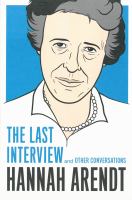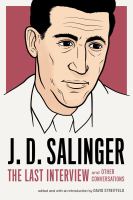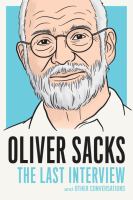
A new display in the James B. Duke Library highlights books in The Last Interview series.
 Hannah Arendt: The Last Interview and Other Conversations In these interviews—including her final interview given in October 1973, in the midst of Watergate and the Yom Kippur War—Hannah Arendt discusses politics, war, protest movements, the Eichmann trial, Jewish identity, and language with the incisiveness and courage that always set her apart.
Hannah Arendt: The Last Interview and Other Conversations In these interviews—including her final interview given in October 1973, in the midst of Watergate and the Yom Kippur War—Hannah Arendt discusses politics, war, protest movements, the Eichmann trial, Jewish identity, and language with the incisiveness and courage that always set her apart.
Philip K. Dick: The Last Interview and Other Conversations One of the 20th century’s most prolific, influential, and dazzlingly original science fiction writers, Philip K. Dick spent his career navigating the contours of perception and questioning the nature of reality: What does it mean to be human? What is time? What is god? But for much of his life, Dick banged away in relative obscurity, publishing at the rate of a hack, utterly ostracized by the literary establishment. The interviews collected here—from the very first, when Dick was just a 26-year-old kid from Berkeley, to the last, conducted the day before he suffered the stroke that killed him—reveal a man plagued by bouts of manic paranoia and failed suicide attempts; a writer fueled by alcohol, amphetamines, and mystical inspiration; and, above all, a magnificent and generous imagination at work.
David Bowie: The Last Interview and Other Conversations The massive, world-wide outpouring of grief at the death of David Bowie notably focused on not only his stunning musical output, but also his fascinating refusal to stay the same—the same as other trending artists, or even the same as himself. In this remarkable collection, Bowie reveals the fierce intellectualism, artistry, and humor behind it all. From his very first interview—as a teenager on the BBC, before he was even a musician—to his last, Bowie takes on the most probing questions, candidly discussing his sexuality, his drug usage, his sense of fashion, how he composed, and more.
 Jane Jacobs: The Last Interview and Other Conversations Hailed by the New York Times Book Review as “perhaps the single most influential work in the history of town planning,” Jane Jacobs’s The Death and Life of Great American Cities was instantly recognized as a masterpiece upon its publication in 1961. In the decades that followed, Jacobs remained a brilliant and revered commentator on architecture, urban life, and economics until her death in 2006. These interviews capture Jacobs at her very best and are an essential reminder of why Jacobs was—and remains—unrivaled in her analyses and her ability to cut through cant and received wisdom.
Jane Jacobs: The Last Interview and Other Conversations Hailed by the New York Times Book Review as “perhaps the single most influential work in the history of town planning,” Jane Jacobs’s The Death and Life of Great American Cities was instantly recognized as a masterpiece upon its publication in 1961. In the decades that followed, Jacobs remained a brilliant and revered commentator on architecture, urban life, and economics until her death in 2006. These interviews capture Jacobs at her very best and are an essential reminder of why Jacobs was—and remains—unrivaled in her analyses and her ability to cut through cant and received wisdom.
Oliver Sacks: The Last Interview and Other Conversations Oliver Sacks—called “the poet laureate of medicine” by the New York Times—illuminated the mysteries of the brain for a wide audience in a series of richly acclaimed books, including Awakenings and The Man Who Mistook His Wife for a Hat, and numerous New Yorker articles. In this collection of interviews, Sacks is at his most candid and disarming, rich with insights about his life and work. Any reader of Oliver Sacks will find in this book an entirely new way of looking at a brilliant writer.
Learning to Live Finally: The Last Interview Sometimes called “obscure” and branded “abstruse” by his critics, the Derrida found in this book is open and engaging, reflecting on a long career challenging important tenets of European philosophy from Plato to Marx. The contemporary meaning of Derrida’s work is also examined, including a discussion of his many political activities. But, as Derrida says, “To philosophize is to learn to die”; as such, this philosophical discussion turns to the realities of his imminent death—including life with a fatal cancer. In the end, this interview remains a touching final look at a long and distinguished career.
 David Foster Wallace: The Last Interview and Other Conversations In intimate and eloquent interviews, including the last he gave before his suicide, the writer hailed by A.O. Scott of The New York Times as “the best mind of his generation” considers the state of modern America, entertainment and discipline, adulthood, literature, and his own inimitable writing style. The volume includes among others interviews with Laura Miller, Dave Eggers, and the student magazine of Wallace’s own alma mater, Amherst.
David Foster Wallace: The Last Interview and Other Conversations In intimate and eloquent interviews, including the last he gave before his suicide, the writer hailed by A.O. Scott of The New York Times as “the best mind of his generation” considers the state of modern America, entertainment and discipline, adulthood, literature, and his own inimitable writing style. The volume includes among others interviews with Laura Miller, Dave Eggers, and the student magazine of Wallace’s own alma mater, Amherst.
 Kurt Vonnegut: The Last Interview and Other Conversations During his long career Kurt Vonnegut won international praise for his novels, plays, and essays. In this new anthology of conversations with Vonnegut—which collects interviews from throughout his career—we learn much about what drove Vonnegut to write and how he viewed his work at the end.
Kurt Vonnegut: The Last Interview and Other Conversations During his long career Kurt Vonnegut won international praise for his novels, plays, and essays. In this new anthology of conversations with Vonnegut—which collects interviews from throughout his career—we learn much about what drove Vonnegut to write and how he viewed his work at the end.
Jorge Luis Borges: The Last Interview and Other Conversations Days before his death, Borges gave an intimate interview to his friend, the Argentine journalist Gloria Lopez Lecube. That interview is translated for the first time here, giving English-language readers a new insight into his life, loves, and thoughts about his work and country at the end of his life. Accompanying that interview are a selection of the fascinating interviews he gave throughout his career. Highlights include his celebrated conversations with Richard Burgin during Borges’s time as a lecturer at Harvard University, in which he gives rich new insights into his own works and the literature of others, as well as discussing his now oft-overlooked political views. The pieces combine to give a new and revealing window on one of the most celebrated cultural figures of the past century.
 Nora Ephron: The Last Interview and Other Conversations Packed with her characteristic wit, wisdom, and charm, this collection of interviews with Nora Ephron celebrates one of the most beloved voices in American film and letters. Ranging from her days as a writer for Esquire and New York—well before Silkwood, When Harry Met Sally and Sleepless in Seattle catapulted her to stardom—to her very last interview, this collection shines a spotlight on the life and work of a dazzling talent.
Nora Ephron: The Last Interview and Other Conversations Packed with her characteristic wit, wisdom, and charm, this collection of interviews with Nora Ephron celebrates one of the most beloved voices in American film and letters. Ranging from her days as a writer for Esquire and New York—well before Silkwood, When Harry Met Sally and Sleepless in Seattle catapulted her to stardom—to her very last interview, this collection shines a spotlight on the life and work of a dazzling talent.
 J.D. Salinger: The Last Interview and Other Conversations From the moment J. D. Salinger published The Catcher in the Rye in 1951, he was stalked by besotted fans, would-be biographers, and pushy journalists. In this collection of rare and revealing encounters with the elusive literary giant, Salinger discusses—sometimes willingly, sometimes grudgingly—what that onslaught was like, the autobiographical origins of his art, and his advice to writers. Including his final, surprising interview, and with an insightful introduction by New York Times journalist David Streitfeld, these enlightening, provocative, and even amusing conversations reveal a writer fiercely resistant to the spotlight but powerless to escape its glare.
J.D. Salinger: The Last Interview and Other Conversations From the moment J. D. Salinger published The Catcher in the Rye in 1951, he was stalked by besotted fans, would-be biographers, and pushy journalists. In this collection of rare and revealing encounters with the elusive literary giant, Salinger discusses—sometimes willingly, sometimes grudgingly—what that onslaught was like, the autobiographical origins of his art, and his advice to writers. Including his final, surprising interview, and with an insightful introduction by New York Times journalist David Streitfeld, these enlightening, provocative, and even amusing conversations reveal a writer fiercely resistant to the spotlight but powerless to escape its glare.
Gabriel Garcia Marquez: The Last Interview and Other Conversations Beloved by readers of nearly all ages, he is perhaps the most popular literary novelist in translation—and he remains so today, a decade after the publication of his final novel. In addition to the first-ever English translation of Marquez’s last interview, this unprecedented volume includes his first interview, conducted while he was in the throes of writing One Hundred Years of Solitude, which reveals the young writer years before the extraordinary onslaught of success that would make him a household name around the world. Also featured is a series of unusually wide-ranging conversations with Marquez’s friend Plinio Apuleyo Mendoza—surely the only interview with Marquez that includes the writer’s insights into both the meaning of true love and the validity of superstitions.
James Baldwin: The Last Interview and Other Conversations “I was not born to be what someone said I was. I was not born to be defined by someone else, but by myself, and myself only.” When, in the fall of 1987, the poet Quincy Troupe traveled to the south of France to interview James Baldwin, Baldwin’s brother David told him to ask Baldwin about everything—Baldwin was critically ill and David knew that this might be the writer’s last chance to speak at length about his life and work. The result is one of the most eloquent and revelatory interviews of Baldwin’s career, a conversation that ranges widely over such topics as his childhood in Harlem, his close friendship with Miles Davis, his relationship with writers like Toni Morrison and Richard Wright, his years in France, and his ever-incisive thoughts on the history of race relations and the African-American experience. Also collected here are significant interviews from other moments in Baldwin’s life, including an in-depth interview conducted by Studs Terkel shortly after the publication of Nobody Knows My Name. These interviews showcase, above all, Baldwin’s fearlessness and integrity as a writer, thinker, and individual, as well as the profound struggles he faced along the way.
Ernest Hemingway: The Last Interview and Other Conversations An extraordinary collection of pugnacious, charming, and revealing interviews with the Nobel Prize-winning author who defined and transformed American literature. Hemingway was not only known for his understated style, but for his public image as America’s greatest author and journalist—and for the grand, expansive, adventurous way he lived his life. The prickly wit and fierce dedication to his craft that defined Hemingway’s life and work shine through in this unprecedented collection of interviews.








